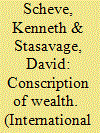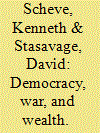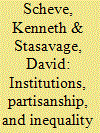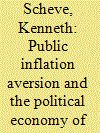| Srl | Item |
| 1 |
ID:
099869


|
|
|
|
|
| Publication |
2010.
|
| Summary/Abstract |
The dominant narrative of the politics of redistribution in political science and economics highlights the signature role of the rise of electoral democracy and the development of political parties that mobilize working-class groups. We argue in this article that this narrative ignores the critical role played by mass warfare in the development of redistributive public policies. Focusing attention on the determinants of progressive taxation, we argue that mobilization for mass warfare led to demands for increased taxation of the wealthy to more fairly distribute the burden for the war effort. We then show empirically that during the past century, mass mobilization for war has been associated with a notable increase in tax progressivity. In the absence of war, neither the establishment of universal suffrage, nor the arrival of political control by parties of the left is systematically associated with large increases in tax progressivity. In making these arguments, we devote particular attention to a "difference-in-differences" comparison of participants and nonparticipants in World War I.
|
|
|
|
|
|
|
|
|
|
|
|
|
|
|
|
| 2 |
ID:
113543


|
|
|
|
|
| Publication |
2012.
|
| Summary/Abstract |
In this article we use an original data set to provide the first empirical analysis of the political economy of inherited wealth taxation that covers a significant number of countries and a long time frame (1816-2000). Our goal is to understand why, if inheritance taxes are often very old taxes, the implementation of inheritance tax rates significant enough to affect wealth inequality is a much more recent phenomenon. We hypothesize alternatively that significant taxation of inherited wealth depended on (1) the extension of the suffrage and (2) political conditions created by mass mobilization for war. Using a difference-in-differences framework for identification, we find little evidence for the suffrage hypothesis but very strong evidence for the mass mobilization hypothesis. Our study has implications for understanding the evolution of wealth inequality and the political conditions under which countries are likely to implement policies that significantly redistribute wealth and income.
|
|
|
|
|
|
|
|
|
|
|
|
|
|
|
|
| 3 |
ID:
087045


|
|
|
|
|
| Publication |
2009.
|
| Summary/Abstract |
It has been widely suggested by political scientists and economists, based on empirical evidence for the period since 1970, that the institution of centralized wage bargaining and the presence of a government of the left are associated with lower levels of income inequality. The authors make use of new data on top income shares as well as long-run series on wage inequality to examine the effects of partisanship and wage bargaining over a much longer time period, nearly the entire twentieth century. Their empirical results provide little support for the idea that either of these two factors is correlated with income inequality over this period. They then show that a closer look at the introduction of centralized wage bargaining in individual countries during the middle part of the twentieth century reveals that in countries that moved to centralize wage bargaining, income inequality had already been trending downward well before the institutional change, that the move to centralized bargaining did not alter this trend, and that these changes in income inequality were also observed in countries that did not adopt centralized wage bargaining at this time. The results suggest that there were alternative institutional paths to reduced income inequality during most of the twentieth century. This raises the possibility that either structural economic changes or commonly shared economic and political events, such as world wars and economic crises, may ultimately be more important for understanding the evolution of income inequality than are the institutional or partisan characteristics commonly considered to be decisive by political scientists.
|
|
|
|
|
|
|
|
|
|
|
|
|
|
|
|
| 4 |
ID:
051542


|
|
|